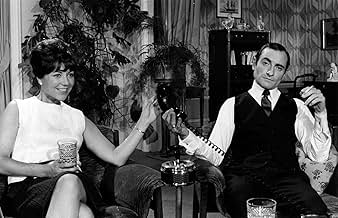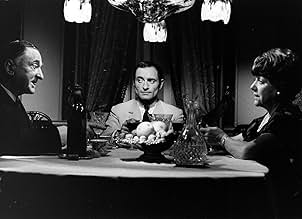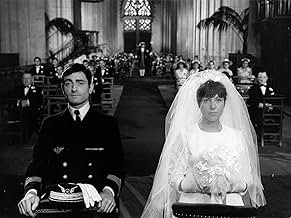VALUTAZIONE IMDb
7,5/10
1441
LA TUA VALUTAZIONE
Aggiungi una trama nella tua linguaAfter fifteen years of average married life and stifling in-laws, a businessman undergoes a midlife crisis and pursues his attractive young secretary.After fifteen years of average married life and stifling in-laws, a businessman undergoes a midlife crisis and pursues his attractive young secretary.After fifteen years of average married life and stifling in-laws, a businessman undergoes a midlife crisis and pursues his attractive young secretary.
- Premi
- 1 candidatura
Louis Maïss
- Monsieur Girard
- (as Louis Maiss)
Trama
Lo sapevi?
- QuizThe white and red sports cars driven by Agnes and Pierre respectively are both French 1969 Matra M530 's.
- ConnessioniFeatured in The Climb - La salita (2019)
- Colonne sonoreLes Heures Tournent
Music by Annie Fratellini and Claude Stieremans
Lyrics by Sylvie Blanc
Performed by Annie Fratellini
Recensione in evidenza
What an utter delight! How have I only stumbled onto this by chance? How is this not more widely known? I had absolutely no foreknowledge or expectations when I sat down, but I completely adore this movie. Filmmaker Pierre Étaix, and co-writer Jean-Claude Carrière, have created a truly great comedy that's more fun and inventive than countless others one could name. The title and premise seem ordinary enough, yet 'Le grand amour' is a stroke of genius I simply couldn't have anticipated.
The feature maintains a consistently low-key, restrained tone, a vibe that lets its humor and playful whimsy stand out all the more. There's relatively little need for dialogue, or even substantial plot, as protagonist Pierre's imagination takes over while considering his stagnant marriage and mid-life crisis - that is, Pierre's imagination, and other characters'. Rather, Étaix and Carrière's screenplay relies predominantly on wonderfully smart, clever scene writing by which every small moment, whether narration, recollection, dream, or daydream, can stand tall all by itself while building the overall story. With that foundation other elements of the picture are allowed to flourish that usually are taken for granted, feeding directly into every gag and joke: Henri Lanoë's perfectly fluid editing, and Jean Boffety's rich, vibrant cinematography; simple effects, adding to detailed and imaginative sets; even set decoration, and hair and makeup, whose fine minutiae are essential to the fanciful humor. 'Le grand amour' plays fast and loose with what sense of reality it fosters for its tale - not in so emphatic a way as has been true elsewhere, and not specifically breaking the fourth wall, but nearly becoming fantastical in the process. And it does so with such natural, easy smoothness that if one weren't paying attention to what the movie were doing, it may seem scattered and disjointed, an impression that would be direly mistaken.
As smart as the writing is the cast (led by Étaix himself) is likewise allowed to play it straight much more than not, and they excel at it. For lack of clamor the quiet wit is thusly amplified, and in those more infrequent instances when a scene requires more abject silliness, or the heightened and exaggerated emotions we'd normally assume of comedies, it rather feels like the instance has been deftly and joyfully prepared. Or to put it another way, the more plainly ridiculous bits feel like the punchline following a long set-up, except in this case the set-up succeeds on its own even without that pay-off. And with Étaix's strong vision and guiding hand as director, there's no chance of any tiny part of the production failing the fabulous intelligence he and Carrière poured into its conjuration.
Whether out of praise or criticism, it's hard to especially describe comedy without ruining the joke, or betraying spoilers. It's hard for me to convey just how splendidly ingenious this is, without any need for profanity, raunchiness, or the boorish, loud-mouthed shenanigans one can generally assume from its more modern kin (e.g. 'The 40-year old virgin,' 'Blades of glory,' 'The hangover'). I can only repeat that this Étaix's 1969 picture is tremendously bright and dexterous, and I cannot overstate what a pleasure it is to watch. It doesn't matter who you are or what your preferences tend to be, this is a luminous slice of gaiety that I think anyone can appreciate, and it's even appropriate for all ages! However you need to go about watching 'Le grand amour,' I'm happy to say it earns my very highest, most enthusiastic recommendation!
The feature maintains a consistently low-key, restrained tone, a vibe that lets its humor and playful whimsy stand out all the more. There's relatively little need for dialogue, or even substantial plot, as protagonist Pierre's imagination takes over while considering his stagnant marriage and mid-life crisis - that is, Pierre's imagination, and other characters'. Rather, Étaix and Carrière's screenplay relies predominantly on wonderfully smart, clever scene writing by which every small moment, whether narration, recollection, dream, or daydream, can stand tall all by itself while building the overall story. With that foundation other elements of the picture are allowed to flourish that usually are taken for granted, feeding directly into every gag and joke: Henri Lanoë's perfectly fluid editing, and Jean Boffety's rich, vibrant cinematography; simple effects, adding to detailed and imaginative sets; even set decoration, and hair and makeup, whose fine minutiae are essential to the fanciful humor. 'Le grand amour' plays fast and loose with what sense of reality it fosters for its tale - not in so emphatic a way as has been true elsewhere, and not specifically breaking the fourth wall, but nearly becoming fantastical in the process. And it does so with such natural, easy smoothness that if one weren't paying attention to what the movie were doing, it may seem scattered and disjointed, an impression that would be direly mistaken.
As smart as the writing is the cast (led by Étaix himself) is likewise allowed to play it straight much more than not, and they excel at it. For lack of clamor the quiet wit is thusly amplified, and in those more infrequent instances when a scene requires more abject silliness, or the heightened and exaggerated emotions we'd normally assume of comedies, it rather feels like the instance has been deftly and joyfully prepared. Or to put it another way, the more plainly ridiculous bits feel like the punchline following a long set-up, except in this case the set-up succeeds on its own even without that pay-off. And with Étaix's strong vision and guiding hand as director, there's no chance of any tiny part of the production failing the fabulous intelligence he and Carrière poured into its conjuration.
Whether out of praise or criticism, it's hard to especially describe comedy without ruining the joke, or betraying spoilers. It's hard for me to convey just how splendidly ingenious this is, without any need for profanity, raunchiness, or the boorish, loud-mouthed shenanigans one can generally assume from its more modern kin (e.g. 'The 40-year old virgin,' 'Blades of glory,' 'The hangover'). I can only repeat that this Étaix's 1969 picture is tremendously bright and dexterous, and I cannot overstate what a pleasure it is to watch. It doesn't matter who you are or what your preferences tend to be, this is a luminous slice of gaiety that I think anyone can appreciate, and it's even appropriate for all ages! However you need to go about watching 'Le grand amour,' I'm happy to say it earns my very highest, most enthusiastic recommendation!
- I_Ailurophile
- 18 apr 2023
- Permalink
I più visti
Accedi per valutare e creare un elenco di titoli salvati per ottenere consigli personalizzati
Dettagli
- Data di uscita
- Paese di origine
- Lingua
- Celebre anche come
- Le Grand Amour
- Luoghi delle riprese
- Cathédrale Saint-Gatien, Place de la Cathédrale, Tours, Indre-et-Loire, Francia(marriage ceremony, exterior)
- Aziende produttrici
- Vedi altri crediti dell’azienda su IMDbPro
Contribuisci a questa pagina
Suggerisci una modifica o aggiungi i contenuti mancanti

Divario superiore
By what name was No, no, no, con tua madre non ci sto! (1969) officially released in Canada in English?
Rispondi


















